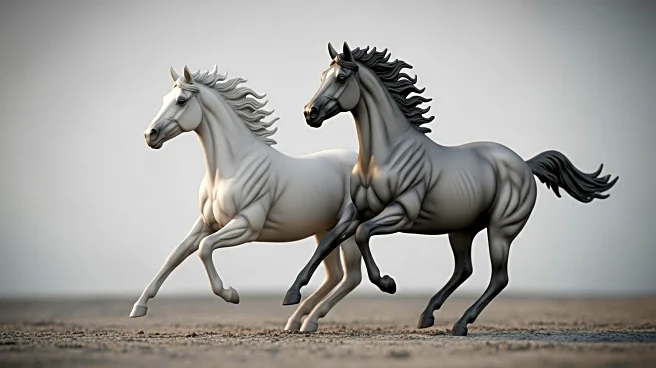What is the story about?
What's Happening?
The Prix de l’Arc de Triomphe, one of Europe's most prestigious horse racing events, is facing unexpected challenges due to significant rainfall that has softened the ground. This change in conditions is particularly disadvantageous for the Japanese contenders Byzantine Dream, Alohi Alii, and Croix Du Nord, who were initially strong competitors. The soft ground is not typical for Japanese racing, which usually occurs on faster surfaces, thus reducing their chances of success. European horses, particularly those from France, Ireland, and England, are now favored in the betting odds, with French trainer André Fabre having a strong chance with his horses Sosie and Cualificar.
Why It's Important?
The shift in ground conditions at the Prix de l’Arc de Triomphe highlights the impact of weather on international horse racing competitions. Japanese horses, which are bred for faster ground, face a significant disadvantage, potentially affecting their performance and the betting market. This situation underscores the importance of adaptability in racing strategies and breeding programs. European contenders, more accustomed to varied conditions, may benefit from this change, potentially altering the outcome of the race and influencing future breeding and training decisions in the industry.
What's Next?
As the race approaches, trainers and jockeys will need to adjust their strategies to accommodate the softer ground. The Japanese team may need to reconsider their approach, while European trainers might capitalize on the favorable conditions. The outcome of the race could influence future breeding and training practices, particularly in Japan, where adapting to different ground conditions might become a priority. The results will also impact betting markets and could lead to shifts in international racing dynamics.
Beyond the Headlines
The unexpected weather conditions at the Prix de l’Arc de Triomphe could lead to broader discussions about climate change and its impact on sports. As weather patterns become less predictable, the horse racing industry may need to adapt by developing more versatile breeding programs and training methods. This event could serve as a catalyst for innovation in the industry, encouraging a reevaluation of traditional practices and fostering resilience against environmental changes.

















